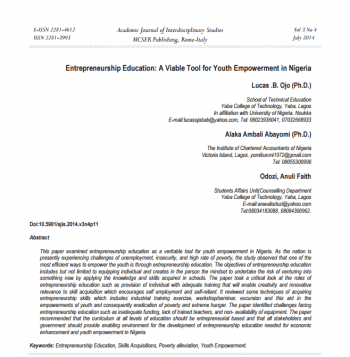- Nigeria faces high rates of unemployment and poverty, especially among youth. Entrepreneurship education – aimed at promoting the growth of an enterprise through technical and vocational training – is used as a tool for youth empowerment.
- Several factors hinder entrepreneurship education, including: 1) poor enterprising culture; 2) lack of trained teachers; 3) unavailability of funds, facilities and equipment; 4) non-inclusion of entrepreneurship programmes in school curricula; and 5) isolated, incoherent programmes
- Recommended strategies to promote more effective entrepreneurship education and youth empowerment are: 1) establishment of business schools, including a recognized entrepreneurship program; 2) investment in economic friendly environment, to begin with a reduction of taxes on small scale businesses; 3) creation of incentives for students to start their own business; 4) facilitate incorporation of work-based learning in entrepreneurship programmes; and 5) encouragement of private partners and NGOs to participate in / contribute to entrepreneurship programmes.










